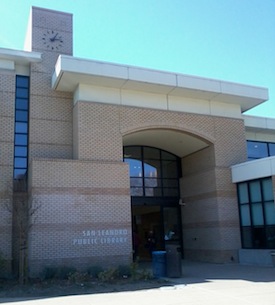
Fastest library in the West?
Google’s Chromebooks have found a very useful niche in California libraries, thanks to a pilot program by the State Library. Jarrid Keller, acting deputy state librarian, outlined the project in a presentation to the California Broadband Council.
Internet access is an increasingly important – maybe the most demanded – service provided by public libraries. A recent survey by the Institute of Museum and Library Services found that 45% of library customers connect to the Internet any time they visit. Equipment, desk space and bandwidth are major limiting factors, sometimes resulting in long waits to get on line.
Chromebooks help solve two of those problems. Thin in both hardware and onboard applications, these laptops can typically be found in the $200 to $300 range, brand new, from major manufacturers. Google developed the Chrome operating system to support online applications and content, and little else. That makes it a difficult sell to most consumers, who don’t always use laptops where fast-enough Internet service is continuously available.
Libraries, on the other hand, can check out Chromebooks to patrons, who can use the fast and free WiFi service available on the spot or take the devices home (or to McDonalds or wherever Internet access can be found). Google provides online administrative tools, allowing easy maintenance and support by thinly stretched staff. It also makes a stolen or overdue device nearly useless, greatly reducing temptation.
The California State Library used a $500,000 grant to buy, set up, distribute and support nearly a thousand Chromebooks in forty-four libraries. According to Keller, each Chromebook has been checked out about a hundred times so far, on the average. And the popularity of the program is growing.
The third problem – sufficient Internet bandwidth – is slowly yielding. The State Library is helping find answers, so are local initiatives like Lit San Leandro. Once broadband infrastructure is in place, the problem becomes solvable.
